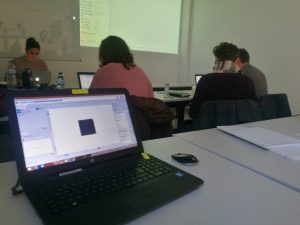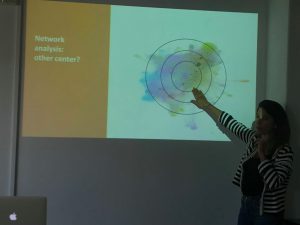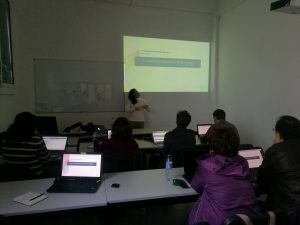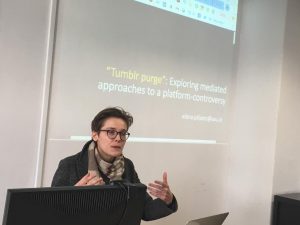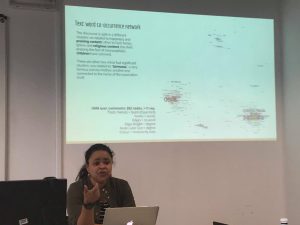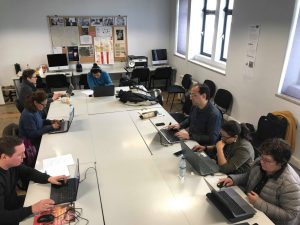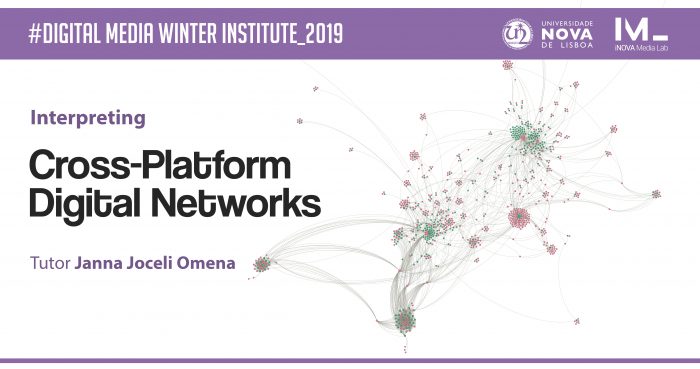 Interpreting Cross-Platform Digital Networks
Interpreting Cross-Platform Digital Networks
Janna Joceli Omena*
4 – 7 February 2018.
10:00 – 13:00.
Limit of 20 participants.
Digital networks offer ways of understanding social and cultural phenomena and network analysis has become a common approach in several fields of research, facilitated by a large list of open-source data extraction tools. Whenever we click, see, rate, like, post, download or comment, our digital actions – for instance, the analysis of retweet chains, hashtags, images or pages – become traceable and ready to be interpreted as nodes in a network. How can digital networks be read across different platforms? Rather than relying on the use of statistics, this course proposes to approach cross-platform digital networks by looking at the platforms’ vernacular, the relational nature of digital data in tandem with the medium (Rogers, 2013), and the affordances of spacialization algorithms (Venturini et al. 2015; 2017) – namely Force Atlas 2 in Gephi. Addressing this matter, the course will present some guidelines for interpreting cross-platform digital networks by introducing the technique of visual network exploration and conducting practical exercises in data extraction and analysis.
Skills required
Participants are encouraged to prepare for the workshop by making themselves acquainted with the principles of networks analysis and the basics of the desktop application Gephi. It is important to stress that the workshop will focus on exploratory data analysis in Gephi, not on encompassing the process of how to use the software itself. Sample datasets will be provided for the participants, but they are also encouraged to bring their own datasets (originated from different web platforms).
Applications and Tuition Fee:
Please send an email to smart.inovamedialab[at]fcsh.unl.pt with your CV (with photo) and a brief statement introducing your research interests and explaining how this workshop may benefit your current work.
The deadline for applications is 20 January 2018. The cost of “Interpreting Cross-Platform Digital Networks” is 160 euros for the general public. There is a different fee for NOVA students (135 euros).
*Janna Joceli Omena is a doctoral researcher in Digital Media’s UT Austin/Portugal Program at Universidade Nova de Lisboa, in which she integrates iNOVA Media Lab – ICNOVA as a member of the scientific committee and coordinator of the SMART Data Sprint. Her research concerns the technicity of social media platforms and how it facilitates or compromises digital research, paying particular attention to the regimes of the functioning of APIs and natively digital objects. Besides theorizing digital methods, Janna has a special interest in software and platform studies.
Research blog: https://thesocialplatforms.wordpress.com
Twitter: @JannaJoceli |
Papers and presentations: Academia | SlideShare | ResearchGate – https://www.researchgate.net/profile/Janna_Joceli_Omena
Projects:
2019.1
China Weibo Network by Matthew Collins (Doctoral researcher, Swansea University, United Kingdom)
Cyberativism: The case of ‘Operação Serenata do Amor’ by Cristiana Freitas (Doctoral Researcher in Digital Media, Universidade Nova de Lisboa)
Mapping of Frugal Innovation actors by Cristian Ruiz (Master in Communication Studies, NOVA FCSH, Portugal)
“Tumbler Purge”: Exploring mediated approaches to a platform-controversy by Elena Pilipets (Ph.D. degree in Media Theory and Cultural Studies at the
University of Klagenfurt, Austria).
Instagram Profiles and Facebook Pages: Are there cross-platform networks? by Elaine Rabello (Assistant Professor at Universidade Estadual do Rio de Janeiro – UERJ, Brazil), Fábio Gouveia (FioCruz, Brazil) and Tânia França (Assistant Professor at UERJ)
2019.2
Article 13 on YouTube: an overview
Rita Sepúlveda
O protagonismo das crianças youtubers
Marta Queiroz

